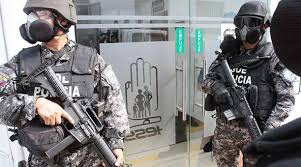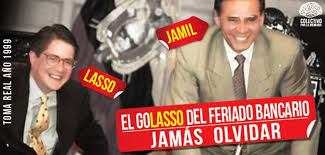Economic crisis in Ecuador 1998-1999
Business cycle, dollarization, trade exchange, economic analysis methods, recession
The biggest economic, financial and social crisis in Ecuador in recent decades began on March 8, 1999 when the government of then-president Jamil Mahuad (1998-2000) decreed the freezing of the deposits of thousands of clients of financial institutions that later they disappeared. Ecuador's banking crisis became evident on March 8, 1999, when a "bank holiday" was declared for one day, which finally lasted for 5 days, at which time all banking transactions were suspended. Meanwhile, Mahuad decreed a "deposit freeze" for one year. Despite the fact that these economic measures were intended to save the banks, there were no positive results and the State assumed the costs. “The consequences were terrible: inflation, devaluation, recession, bankruptcy of companies, unemployment, greater poverty and destitution, deaths, suicides and the largest migratory wave in the history of the country. The economic losses amounted to 8,000 million dollars and the social losses were greater " The government announced the banking holiday that was initially supposed to last 24 hours but that was extended to the point that Ecuadorians had their savings frozen with consequences that remain to this day. The regime froze 1.84 billion of the private banking system; 681.1 million from offshore banking and around 145 million from financial companies, cooperatives and mutuals. At that time, the State intervened 33 financial entities, including large banks such as Popular, La Previsora ??and Pacífico, among others. But years before, the country's financial situation had already deteriorated. Market giants such as Filanbanco and Banco del Progreso entered into crisis, closing later, mainly due to mismanagement and loans linked to companies of the same groups. Thousands of customers claimed their deposits amid unprecedented social unrest.
HE BANKING HOLIDAY IN FIGURE
At that time, inflation reached 60%, unemployment was 14.7%, and the depreciation of the sucre increased 190%. There was a net capital flight of 422 million dollars in 1998 and 891 million in 1999, according to official data, while millions of Ecuadorians migrated hit by the economic effects, others even committed suicide when they saw all their lost savings. The banking holiday was "a phenomenon generated by a small economic group that benefited at the expense of the majority of Ecuadorians," according to a law passed in February of last year that seeks to definitively close with that chapter 21 years later. The effects of the bank holiday were reflected in the reduction of the purchasing power of families with the sucre, the national currency that disappeared shortly after to be replaced by the dollar with an exchange of one dollar for 25,000 sucres. In addition, some 17 banks were closed due to mismanagement, linked loans and other irregularities. The State came to their rescue with a “bailout” that was made with AGD bonds for about 1,400 million that the banks later did not pay. The clients of the banking entities lost their money, others saw their debts grow to the point of being unpayable and very few of those responsible for that crisis paid their actions. For example, 18 years later, the owners of the Filanbanco, William and Roberto Isaías, fugitives in the United States, have not been able to be extradited even though they were sentenced to eight years in prison for embezzlement. The bank holiday also marked what would come next: a migration never seen before. More than two million Ecuadorians were forced to leave for the United States and Spain. After the deposit freeze, in January 2000, the dollarization of the economy would be decreed.
Successive deficits of tax revenue
Another element of the 1998-1999 crisis was the fiscal deficit at the end of the second half of the 1990s, when, due to several successive events, the Ecuadorian State had more outflows than income. According to the statistical information of the Central Bank of Ecuador, the non-financial fiscal deficit of 1998 was the deepest of the decade (-6.76%) 8, and the fiscal deficit of 1999 was -5.6%, slight reduction caused by the increase in taxes.9 One of the most important deficits was caused by the high military expenditures made by the Ecuadorian State to be able to face the 1995 Cenepa war with Peru. There were also unbudgeted expenses for the reconstruction of public works due to the natural disasters of the El Niño phenomenon (which occurred during 1997 and 1998). Add to this the financial crisis in Southeast Asia, which made it difficult for the Ecuadorian State to access international credits to finance its deficit. Finally, what put an end to state finances was the collapse of the world oil price in 1998 and in 1999 the international price of Ecuador's oil dropped to as much as US $ 6.30 per barrel, with the Ecuadorian State being highly dependent on the oil industry to finance the state budget. Faced with this situation of fiscal deficit, there are problems to pay salaries to the public sector and other current expenses of the State, at the same time that the State must respond to its external debt payment obligations in order to access more international credit; The response of the Central Bank of Ecuador was to increase the printing of national currency to pay bureaucratic salaries and other internal expenses of the State, causing a devaluation that will turn into hyperinflation (more than 50% annual inflation). The Central Bank of Ecuador also authorized the printing of sucres in its capacity as lender of last resort in the financial system, to inject funds into banks and prevent them from closing. In 1998, the Ecuadorian State had increased the money supply by 44% in relation to the previous year.
Currency devaluation and banking panic in 1999
During 1999, the Central Bank of Ecuador, in order to save the state budget deficit that prevented it from covering with public spending, implemented a series of devaluation measures of the sucre that it had been implementing since 1998. The effect of decreeing inflation was the depreciation of the savings of the population. In response to the measures of the central bank, the Ecuadorian population began to massively exchange the national currency, sucre, for the US dollar, which provided more confidence. This also meant that many savers decided to withdraw their funds en masse to change them to dollars, generating a bank panic. On March 8, 1999, a 24-hour bank holiday was declared, which finally lasted 5 days. All financial operations were suspended to prevent financial institutions from going bankrupt due to the massive withdrawal of funds from savers. Meanwhile, Mahuad decreed a deposit freeze for 1 year, of accounts of more than 2 million sucres. Even so, financial institutions continued to close their operations.
Consequences
The unresolved economic, financial and political problems were the scene of massive protests in Quito by left-wing political groups opposed to dollarization and the Mahuad government, protests in which a group of middle-ranking army commanders led by Colonel Lucio Gutiérrez mutinied in the National Congress and symbolically declared a "triumvirate," with the participation of civilians and the CONAIE indigenous movement, on the morning of January 21, 2000. Meanwhile, the high command of the Armed Forces of Ecuador withdrew its support for the president, overthrowing to Mahuad on the afternoon of January 21, 2000, trying to establish a military government under the command of General Carlos Mendoza, which would only last a few hours, and then deciding the ascension of Gustavo Noboa as president in the early morning of January 22
Economic instability gave rise to the largest migratory exodus in the history of Ecuador. The migratory wave was mainly concentrated in the northeastern United States, as well as in Spain and Italy. Some Ecuadorian diasporas and communities were born in some cities of the world as a consequence of the migratory crisis, the main ones being in New York, Madrid and Milan.
Temas relacionados:
digital newspaper
school newspaper
digital magazine
free newspaper
create digital newspaper
digital publications
digital content
create free digital newspaper
create free school newspaper
Esta web se reserva el derecho de suprimir, por cualquier razón y sin previo aviso, cualquier contenido generado en los espacios de participación en caso de que los mensajes incluyan insultos, mensajes racistas, sexistas... Tampoco se permitirán los ataques personales ni los comentarios que insistan en boicotear la labor informativa de la web, ni todos aquellos mensajes no relacionados con la noticia que se esté comentando. De no respetarse estas mínimas normas de participación este medio se verá obligado a prescindir de este foro, lamentándolo sinceramente por todos cuantos intervienen y hacen en todo momento un uso absolutamente cívico y respetuoso de la libertad de expresión.
No hay opiniones. Sé el primero en escribir.
Guardiola: &34;At Barça I needed three pistols and 100 bullets to lose the ball&34;













